Key takeaways:
- Identity theft involves illegal use of personal information, impacting financial stability and emotional well-being.
- Reporting identity theft helps recover losses, prevents further misuse, and raises community awareness.
- Regular monitoring of financial statements and credit reports is essential for early detection of identity theft.
- Implementing strong security measures, like credit monitoring and two-factor authentication, can help prevent future identity theft.
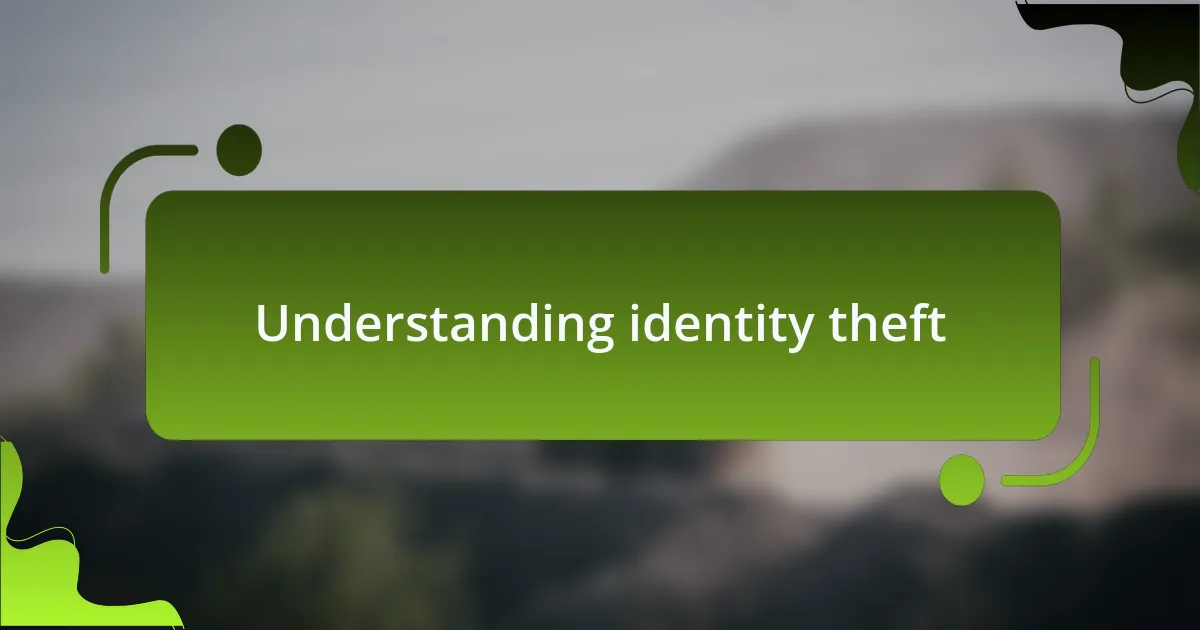
Understanding identity theft
Identity theft occurs when someone illegally uses another person’s personal information, such as their name, Social Security number, or bank details, often for financial gain. I remember the sinking feeling I had when I discovered that my own information had been compromised—it felt like a violation of my personal space, and I couldn’t help but wonder how someone could be so heartless.
The impact of identity theft can be devastating, affecting not only financial stability but also emotional well-being. Have you ever felt the anxiety that comes from realizing your life could be uprooted by somebody else’s actions? That mix of fear and vulnerability can be overwhelming, leading to distrust in everyday activities, like online shopping or even just sharing personal information.
Understanding identity theft also means recognizing its prevalence in our digital age. It’s alarming to think that nearly 15 million people in the U.S. alone experience identity theft each year. This statistic hits home for me—you might think it won’t happen to you until it does. How can we proactively protect ourselves while navigating an increasingly interconnected world? This question lingers in every interaction we have online.
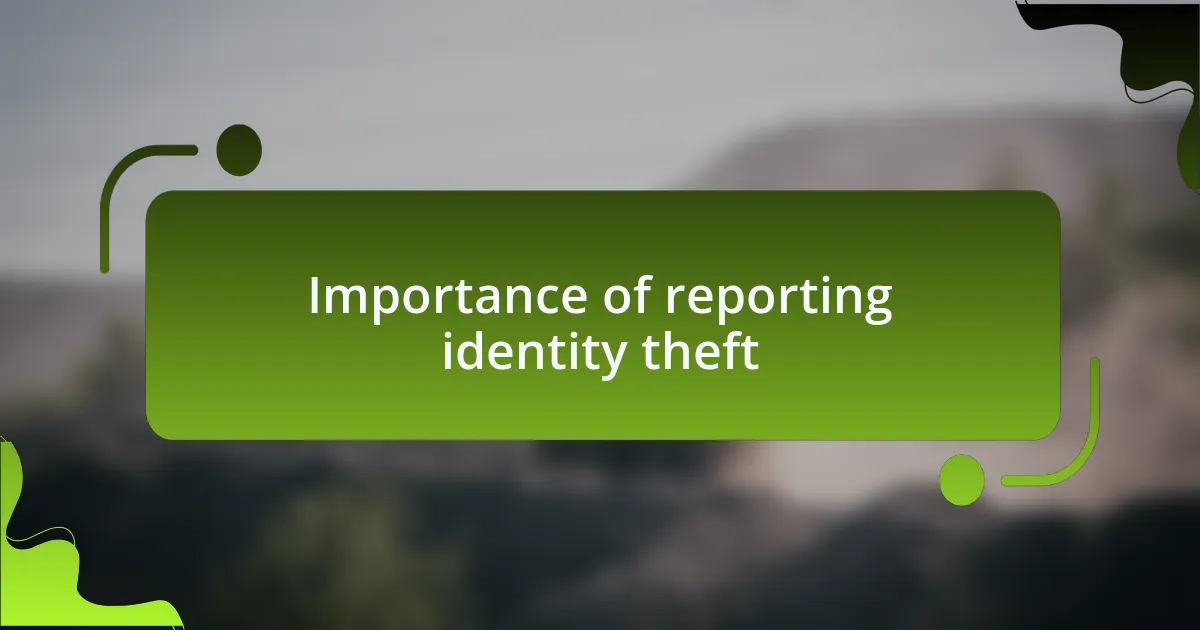
Importance of reporting identity theft
Reporting identity theft is crucial for several reasons. When I reported my own experience, I felt a sense of empowerment in taking control of the situation. It’s not just about recovering what was lost; it’s about preventing further misuse of your information. Have you ever considered how each report creates a ripple effect that helps law enforcement identify patterns and tackle this crime more effectively?
Moreover, timely reporting can significantly mitigate the damage. I remember how quickly I was able to freeze my accounts after reporting the theft, which prevented additional fraudulent charges. Every moment counts; delays can lead to further exploitation. When you look at it this way, reporting isn’t just a necessary step; it’s a lifeline that safeguards your financial future.
Lastly, reporting identity theft raises awareness and educates others. When I shared my story, friends and family became more vigilant about protecting their own information. Do you see the value in collective awareness? By sharing our experiences and insights, we can build a more informed community that’s better equipped to combat identity theft together.
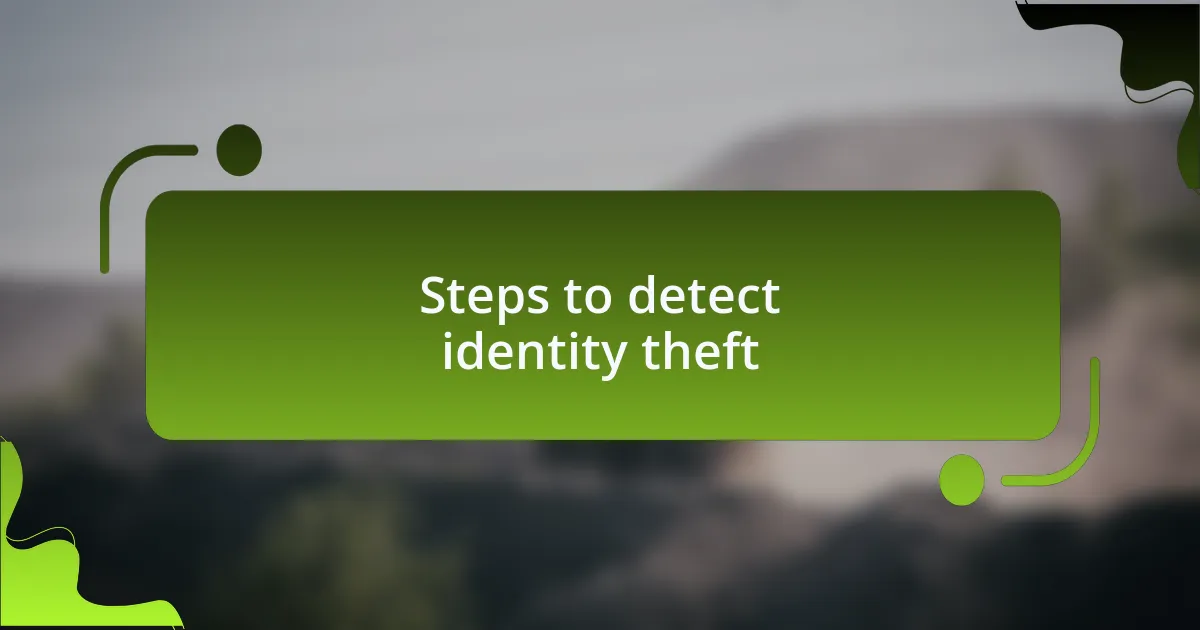
Steps to detect identity theft
Detecting identity theft often begins with careful monitoring of your financial statements. I vividly remember the sinking feeling I had when I noticed a charge I didn’t recognize on my credit card bill. Have you ever closely examined your transactions? When I started scrutinizing every line item, I uncovered not just one, but multiple unauthorized payments that had flown under my radar.
Another effective method is to check your credit reports regularly. There was a time when I requested my report out of curiosity, only to find accounts opened in my name that I never authorized. This experience underscored the importance of vigilance; it was a shocking reminder that I needed to be proactive about my financial health. I can’t stress enough how essential it is to utilize your right to access your credit information—it’s not just about mistakes; it can reveal potential fraud.
Finally, consider setting up alerts on your accounts. After my experience, I started receiving notifications for transactions over a certain amount, and I found this to be a game-changer. Does that sound like something you’d find useful? Whenever I see an alert pop up, it’s a reminder that I’m in control. These small, yet significant steps can be the difference between catching identity theft early versus dealing with the aftermath.
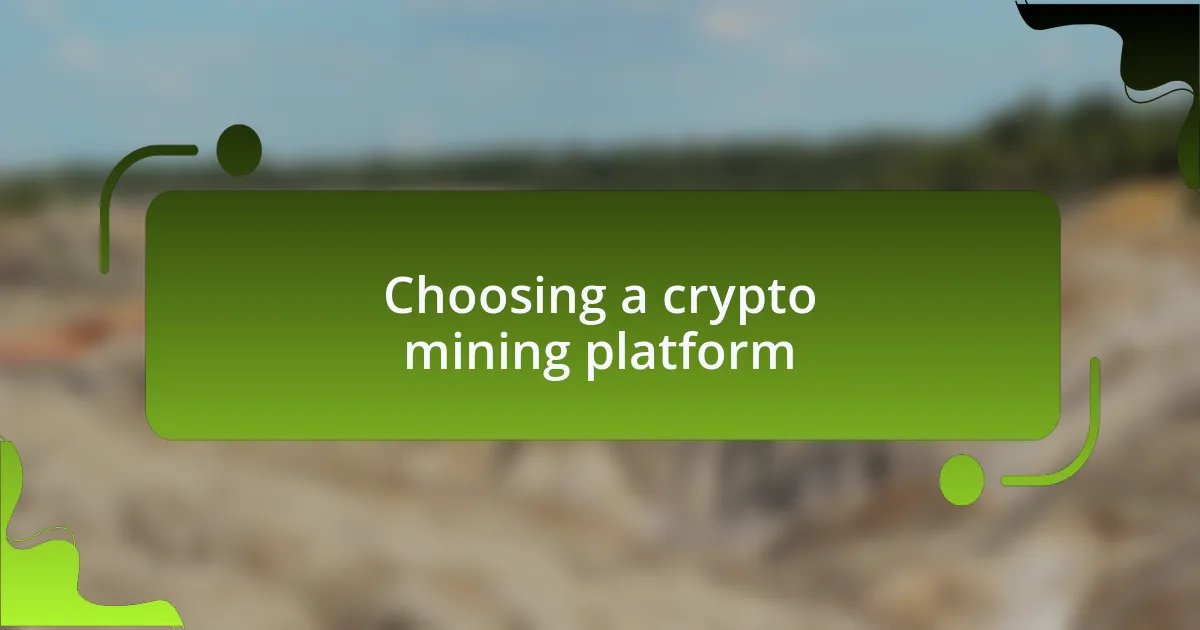
Choosing a crypto mining platform
When it comes to selecting a crypto mining platform, I can’t emphasize enough how crucial it is to assess the security features in place. I once chose a platform that promised high returns, only to face a massive breach that compromised my investments. Have you ever felt the frustration of losing funds due to insufficient security? Trust me, investing time in researching endorsements and user reviews can save you from a lot of headaches down the line.
Cost is another factor I weigh heavily while choosing a mining platform. I recall comparing several options, and the difference in fees was staggering. Some platforms advertised low initial costs but had hidden charges that ate away at my profits. Have you done a deep dive into the fine print before? Understanding the total cost will not only impact your potential earnings but also how sustainable your mining efforts will be.
Lastly, the community support offered by the platform can make a world of difference. When I faced technical difficulties, I appreciated being part of a responsive community that provided guidance. It reassured me to know I wasn’t alone in navigating the complexities of crypto mining. Have you ever thought about how vital it is to have a knowledgeable support network? A platform with engaged forums and prompt customer service can transform your mining experience from daunting to rewarding.
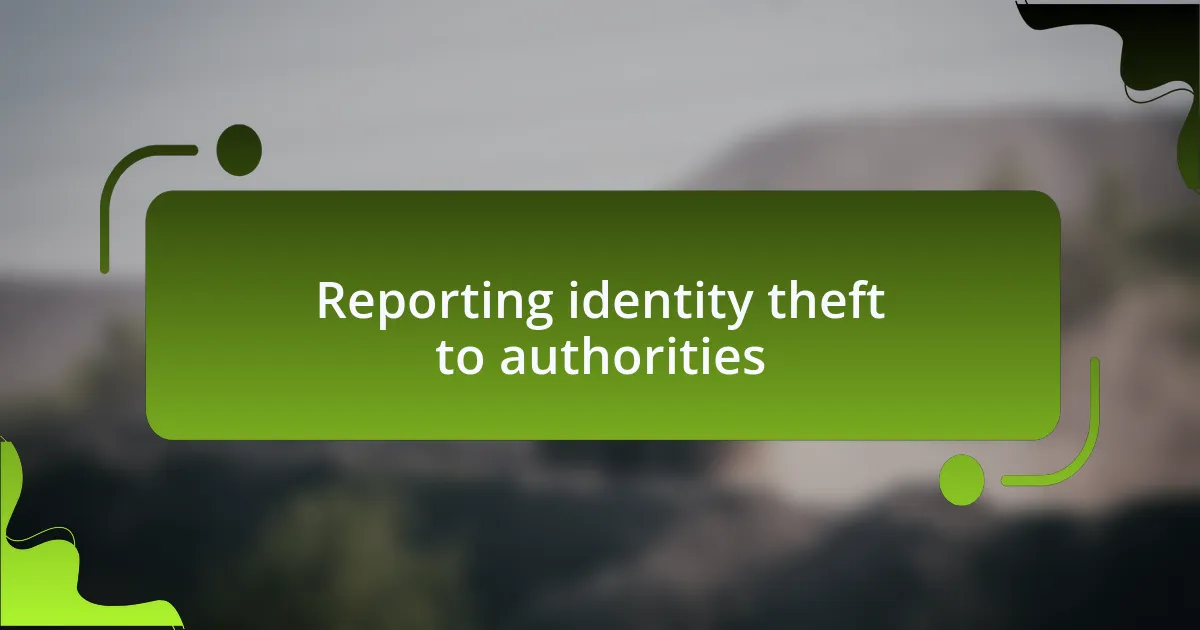
Reporting identity theft to authorities
Reporting identity theft can often feel overwhelming, but taking swift action is crucial. When I found out that my personal information had been compromised, the first step I took was to contact my local authorities. It was surprising to me how responsive they were; they guided me on the necessary forms to fill out and what specific details to provide. Have you ever considered how much relief it brings to have someone assist you through what feels like a daunting process?
I also filed a report with the Federal Trade Commission (FTC), which was essential for documenting the identity theft. I remember thinking about how each official report created a paper trail that strengthened my case. This step not only helped me protect myself but also contributed to a larger effort to combat identity theft in our society. Have you ever thought about the power you hold in reporting such incidents to authorities?
Lastly, I made sure to keep a copy of every document related to my identity theft report. This proved invaluable when I had to communicate with creditors and other institutions later on. There’s a sense of empowerment that comes when you know you’ve taken every possible step to reclaim your identity. How prepared are you to handle such situations, should they arise?
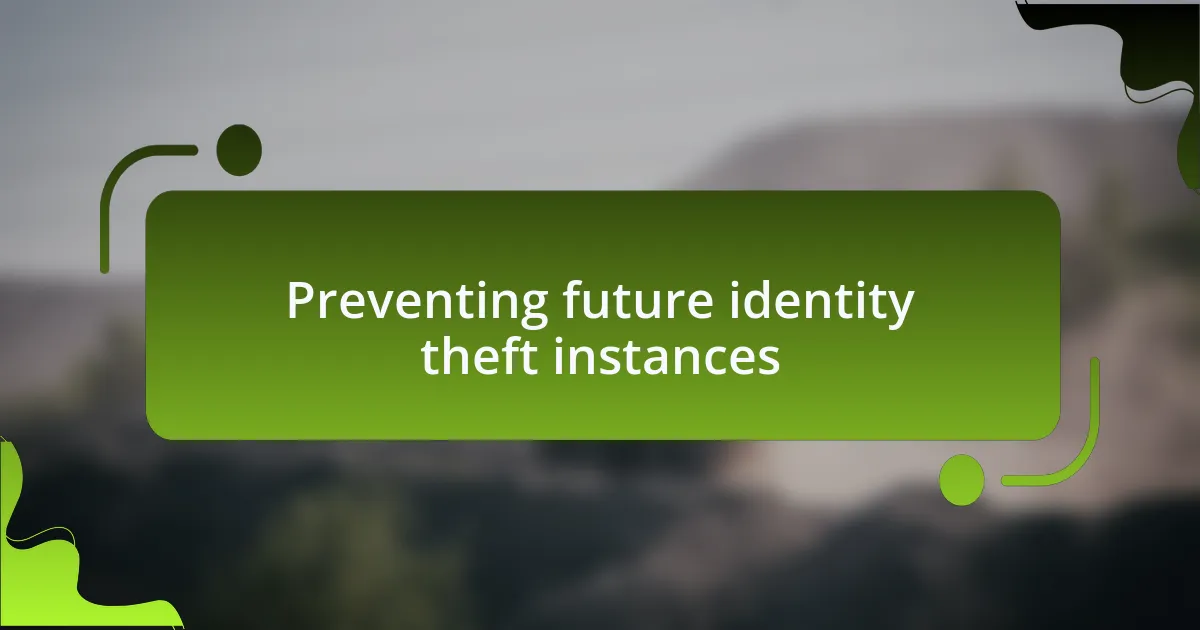
Preventing future identity theft instances
Protecting my personal information became a priority after experiencing identity theft, and I implemented several proactive measures. I signed up for credit monitoring, which alerted me to any unusual activities on my accounts. It’s amazing how much peace of mind this brought me; like having a vigilant guard watching over my finances. Have you thought about how important this kind of monitoring can be for safeguarding your identity?
Additionally, I made a habit of regularly checking my credit report. I found that reviewing my report not only helped me identify potential issues but also gave me an opportunity to understand my financial health better. When was the last time you checked your credit report? Taking this step can illuminate any discrepancies and keep you one step ahead.
Another effective strategy I embraced was strengthening my online security. I started using complex passwords and enabling two-factor authentication on sensitive accounts. The first time I set up these layers of security, I felt an incredible sense of control over my digital identity. It’s fascinating how simple changes can create a robust defense against identity theft. Have you adjusted your security measures recently to better protect your information?